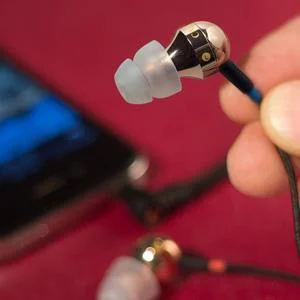Excellence doesn't come overnight. The Cardas EM5813 Model 1 Ear Speakers are the result of over three years of intensive research and development. In his quest to deliver the ultimate in 'earbud' performance, George Cardas has designed every aspect of this exceptional product from the ground up. The result is true high-end sound and a level of sonic achievement that sets a new benchmark for in-ear headphones.
Cardas Ear Speakers work beautifully with a portable headphone amplifier, or plugged straight into a smartphone or media player. All parts that make up the custom designed drivers are machined from proprietary solid bar stock metals in California. All drivers are meticulously hand-matched on each pair of Ear Speakers.
Ear Mirror Technology
The shape of the elegant copper plated brass bodies of the Ear Speakers are designed to work in symphony with the human hearing system.
"Cardas describes his Ear Speakers as using what he terms 'Ear Mirror' technology said to provide a more effective and sonically pleasing connection between the earphone and the wearer's inner ear," notes Chris Martens in his January 24, 2012 Playback post at AVguide.com. Martens terms the EM5813 Model 1 "very good" and comments, "I'm encouraged to see a high-end product developer of George Cardas' stature enter the headphone world, and can only hope that other high-enders follow his example."
Utilizing Ear Mirror technology, the EM5813 mirrors the human cochlea, which is a spiral-shaped cavity in the bony labyrinth of the inner ear. The curve of the headphone's ear tube uses a Golden Ratio curve that mimicks the curve of the cochlea. The Model 1's single driver is approximately the same size of the tympanic membrane, also known as the eardrum – which is a thin, cone-shaped membrane between the external ear from the middle ear whose function is to receive sound vibrations.
"Cardas went to a lot of trouble to make the tube mimic the shape of the cochlea, in proportions that adhere to the Golden Ratio, a longtime Cardas design obsession," reports Mark Fleischman in his January 12, 2012 "CES 2012" blog post for Home Theater magazine. "It seems to have resulted in a long string of great-sounding products."
Golden Ratio Design
The human hearing system, musical chords, and the new Cardas Ear Speakers are all reflections of the Golden Ratio. This aesthetically pleasing proportion of 1.6180339887:1 is as old as nature itself, and it can be seen in the elegant structure of the chambered nautilus shell, which is appropriately the logo of Cardas Audio. 'Discovered' by the Greeks, but adopted by the Egyptians in the Great Pyramid centuries before, the Golden Ratio has been used by man to create our most beautiful and naturally pleasing works of art and architecture.
The infinite indivisibility of the Fibonacci Sequence or Golden Section, derived from the Golden Ratio, is also a key to controlling resonance. This mathematical proportion is used in the design of Cardas cable conductors and other technology that play a critical part in the EM5813.
Every Bit a Cardas Audio Product
The EM5813 is every bit a Cardas Audio product from ear tip to plug. George's developments in new and improved materials that affect the magnetic field of this newly designed driver results in amazing bass performance and transfixing musicality. Even the ultra thin tips were redesigned to have a precise, comfortable fit. The Earspeaker incorporates a Cardas Clear Light headphone cable tipped with custom gold plated, right angle plug that fits most protective cases.
Clear Light Headphone Cable
The Earspeaker's Clear Light headphone cable uses an elegant application of the technology that George Cardas has designed for his top-of-the-line Clear-series cables.
Cardas Clear cables use a newly applied technology to solve the smeared, unfocused sound that's inherent in standard cable designs. Cardas Clear uses Matched Propagation Conductors to deliver what George calls "an unprecedented window of clarity."
One problem with standard audio cable designs is that the cable dielectric accumulates and releases an electrical charge in response to the current flow in the conductor. The discharge of the dielectric lags behind the charge in the conductor, causing a smearing of low-level information in the cable.
Since the so-called 'charge propagation velocity' of the dielectric can never equal the speed of electrical changes in the conductors, George Cardas' ingenious solution with Cardas Clear cables is to slow the conductor to match the rate of the dielectric. Matched Propagation Conductors maintain low level information and natural transients in a way that no other cable can. The insights and technology in all of the Cardas Clear cables bring a new level of clarity and realism to your listening.
Specifications:
- Driver size: 11.5mm
- Cable length: 60"

